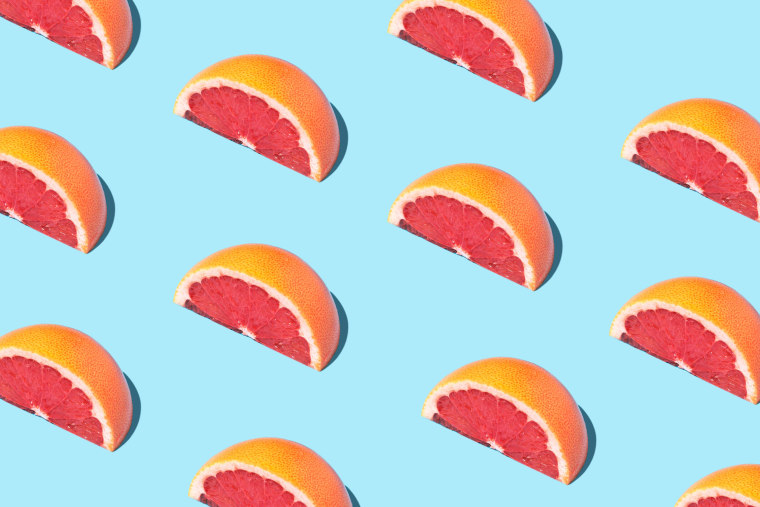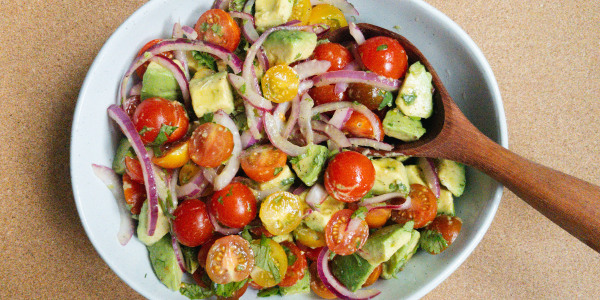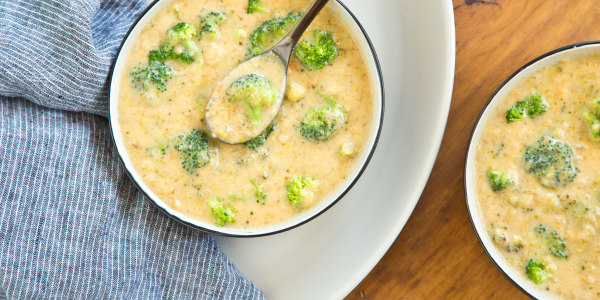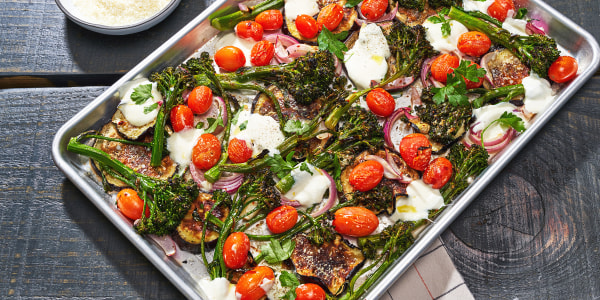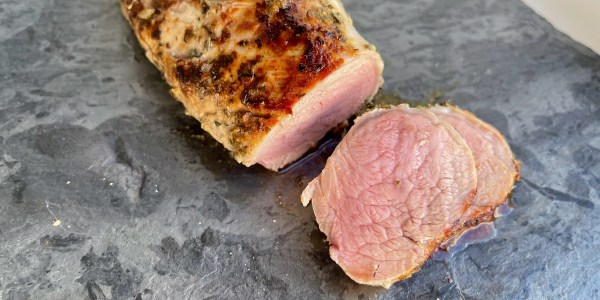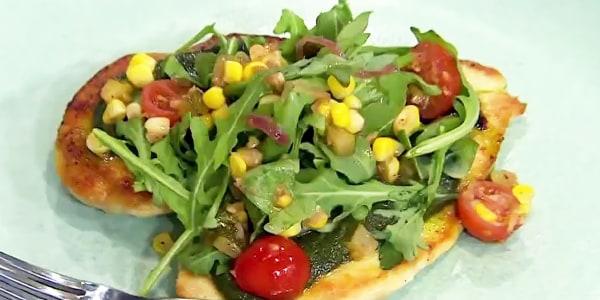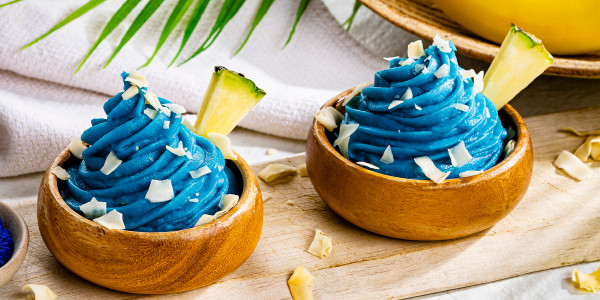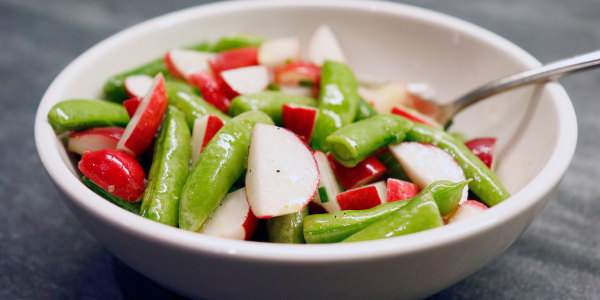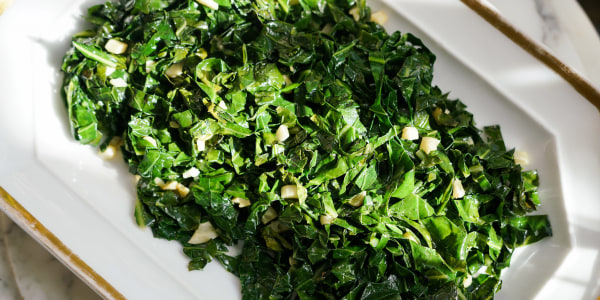For decades, many people have turned to low-carb diets to lose weight. And while this eating pattern may be difficult for some people to maintain long-term, there are plenty of low-carb foods that can offer you some of the diet's health benefits, regardless of whether they're all you choose to eat.
For example, low-carb foods usually contain a lot of fiber, which is good for gut health and losing or maintaining weight. Low-carb vegetables are especially nutritious, thanks to their high vitamin content. Healthy fats are also common in low-carb foods — and good for the heart, cholesterol and inflammation. What's more, many high-carb foods are ultra-processed so steering clear can reduce your risk of health complications long term.
Even if a low-carb diet isn't for you, keeping these low-carb, highly nutritious and delicious foods stocked in your house for meals and snacks can help you look and feel better.
Avocado
A whole avocado has about 15 grams of carbs, but you're unlikely to eat the entire thing in one sitting, so it's more realistic that you'll get 4 or 5 carbs in one meal or snack. It's also high in monounsaturated, aka healthy fats, which can improve cholesterol levels and lose belly fat. A great way to eat an avocado is to mix it with something high in fiber, such as humus or whole-grain bread, or eat it on top of an apple — I promise it's delicious!
Broccoli
Broccoli is considered a cruciferous vegetable, along with cauliflower, Brussels sprouts, kale and arugula. This type of food is high in glucosinolate, which research shows may reduce risk of cancer.
There are 30 calories in one cup of broccoli, 6 grams of carbs and 3 grams of fiber. My go-to way to cook broccoli is to toss it in avocado oil and roast it at 400 degrees. It should be crispy after 20-25 minutes. If you don't want to buy and chop a fresh broccoli head, frozen broccoli is packaged at the peak of freshness and just as nutritious.
Coconut oil
A popular cooking oil for baking, broiling and sautéing thanks to its high cooking temperature, coconut oil is high in medium-chain triglycerides, which are a type of healthy fat that lower bad cholesterol and reduce good cholesterol. Coconut oil also has no carbs.
Eggplant
Eggplant, also known as aubergine, packs in less than 5 grams of grabs in one cup. It's also good for your brain health thanks to its nasunin content, which prevents oxidation in brain cells.
When preparing eggplant, it's best to slice it, sprinkle it with salt, and let it sit for 10 minutes to draw the moisture out. Then, dry it with paper towel, drizzle on some olive oil and pop it in the oven at 375 for about 15 minutes. Don't forget to flip it at the half way mark.
Eggs
One egg has less than one gram of carbs — 0.6 to be exact — but 10 times as much protein, 6 grams. Hard-boiled eggs make for an easy snack on its own or as lunch mashed up on bread or sliced on a salad.
Grapefruit
At 13 grams of carbs per half, a grapefruit is also lower in sugar compared to other citrus fruits. One study showed there was a positive relationship between eating a half of a grapefruit before a meal and weight loss. Section half a grapefruit, sprinkle with cinnamon and a drop of honey and place under the broiler for three to four minutes for a perfect jam-packed nutrient dessert.
Greek yogurt
Each 6-ounce container of greek yogurt has about 6 grams of carbs and a whole lot of protein, approximately 17 grams! Go for one that has no added sugar and add your fave nuts or seeds and berries for a calcium-packed breakfast.
Green beans
Green beans provide you with 7 grams of carbs per cup and are rich in vitamin K, which contributes to your bone health, healthy blood clotting and can help prevent heart disease. Mix 1 cup steamed beans with a teaspoon of pesto and top with a soft-boiled egg or grilled chicken for a super fast, nutrient-dense lunch.
Olives
Snacking on two tablespoons of olives will still have you consuming just under 1 gram of carbs and the antioxidant oleuropein, which is specific to olives and has been shown to lower cholesterol and prevent oxidative stress.
Add olives to Ezekiel toast and goat cheese for a savory breakfast, couple with veggies for a snack or toss onto your go-to romaine salad at dinner.
Peanuts and peanut butter
One ounce provides you with less than 5 grams of carbs and high amounts of biotin, an important vitamin B when it comes to metabolism, nerve and digestive health. Crumble them up before tossing them in a salad, couple a handful with a piece of fruit for a snack or add to your next veggie or tofu stir fry.
Pumpkin seeds
These super seeds have 15 grams of carbs per ounce and are loaded with magnesium, a mineral crucial to maintaining healthy blood pressure and to overall better digestive health. Add to your oatmeal or mix into guacamole to give it a crunch.
Raspberries
A handful of ten of these pretty berries have less than 2.5 grams of carbs. High in manganese, these fiber-filled gems also provide some serious benefits when it comes your bone health. Buy them frozen to always have on hand for smoothies, to top yogurt or drizzle a little dark chocolate over a cup for an extra sweet treat.
Salmon
Salmon is a filling fish that provides you with zero carbs. It’s high in omega-3 fatty acids, which help you burn fat, make your skin glow and fight inflammation. Add salmon to eggs, top a high fiber cracker and a squeeze of lemon or grill with a pomegranate glaze.
Shellfish
A half-cup of shrimp provides you with less than 1 gram of carbs. It’s also low in calories and high protein for all of you watching your waistline. Shellfish also contains zinc, an important mineral for helping your immune system fight off viruses. Stir fry shrimp with broccoli, snap peas, onion and shredded carrots for a fast, simple, healthy weeknight meal.
Sunflower seeds
Six grams of carbs per quarter cup, this seed is known for being high in selenium, a cancer-fighting mineral. Who needs trail mix to get these seeds in? Add them to your main course by sprinkling on roasted Brussels sprouts or sauteéd butternut squash.
Tomatoes
One medium tomato has less than 5 grams of carbs. This perfect sandwich topper has 1.5 grams of fiber and is also rich in beta-carotene, a precursor to vitamin A, which contributes to glowing skin and boosting your immune system.
Chop tomato, onion and mushrooms and add to an egg scramble or hollow out and fill with an almond farro salad for a vegan meal.
Zucchini
Get over 50 percent of your vitamin C needs in one medium-sized zucchini. These veggies have a high water content to help you stay hydrated and to keep you fuller longer. Slice thinly and layer with red sauce and shredded mozzarella cheese for a low carb way to get in your lasagna fix.
Chicken
Chicken is an excellent source of protein and has no carbs. One 4-ounce serving has 26 grams of protein and 120 calories. Chicken can also be used in a variety of ways — such as a salad or pasta topping or alongside roasted veggies or even in soup.
Cottage cheese
Cottage cheese is one of TikTok's favorite ways to get a creamy flavor with more protein and minimal carbs. Half a cup of cottage cheese has only 5 grams of carbs but 12 grams of protein. It's made of curdled milk, where the milk is mixed with live cultures that separate the milk's contents into curds made of fat and protein, and liquid, made of whey. Some extra milk and salt is usually added. Cottage cheese comes in full-fat, low-fat and non-fat options.
Grass-fed beef
Grass-fed beef has no carbs and 22 grams of protein in a 4-ounce serving. Beef that is grass-fed, meaning the cow has eaten entirely grass for most of its life, has healthier fats and more antioxidants. Compared to grain-fed beef, grass-fed beef contains fats that can reduce cancer and heart disease risk, as well as improve cholesterol levels.
Hemp seeds
Hemp seeds are one of the most nutrient dense foods around. By eating 3 tablespoons, you'll get10 grams of protein, 240 milligrams of potassium, up to 20% of your daily iron and just 2 grams of carbs. It also has plenty of healthy, fatty acids that can help reduce inflammation and boost your immune system. Hemp seeds can give your morning yogurt or smoothie an extra punch of nutrition.
Spirulina
Spirulina is a type of green algae that contains comparable quality protein to eggs and is often used as a nutritional supplement. It also contains B complex vitamins, beta-carotene, vitamin E, manganese, zinc, copper, iron, selenium, and gamma linolenic acid, according to Mount Sinai. It has a strong flavor so it's best to eat it with things that mast the taste, like smoothies.
Tempeh
Tempeh is a plant-based protein made of fermented soybeans. It contains probiotics, which are good for the gut, and has 14 grams of protein in a 4-ounce serving. Some people use tempeh as a meat substitute, such as with tempeh bacon, but you can also stir fry it, use it in hash and in a variety of other dishes.
Tofu
Tofu is a popular plant-based meat substitute for people looking to add more protein to their diets. Similar to tempeh, it's made from condensed soy milk. It's delicious to crumble with veggies or eggs, or throw cubes in the air fryer for a crispier, nugget-like bite. It's lower-carb than tempeh, with 20 grams of protein and less than 4 grams of carbs in a 4-ounce serving.
Fennel
Fennel bulbs, from the same plant that produces fennel seeds, contain about 6 grams of carbs for one cup of fennel. It has a sweet, licorice-like flavor and can be easily thrown into a salad or soup. Research indicates it has anti-inflammatory properties, and it's high in potassium, calcium, good fatty acids and magnesium.
Spinach
Spinach contains only 1 gram of carbs in a 1-cup serving, as well as a lot of magnesium, which can have brain health benefits, and fiber, which is good for bowel health, cholesterol levels and blood sugar. Spinach can be easily eaten in a salad, pasta, smoothies, soup or sautéed as a side. It doesn't have a strong flavor so blending it into a sauce can add extra fiber to any dish.
Brussels sprouts
Brussels sprouts contain about 8 grams of carbs in a 1-cup serving. They're also high in fiber, rich in antioxidants and high in vitamin K, which is good for bone health and blood clotting. Try roasting them or eat them raw and shaved into a salad.
Radishes
Radishes are a root vegetable like potatoes that can be cooked somewhat similarly, but they have fewer carbs. You can also eat them. They contain antioxidants, vitamin C, and can help regulate blood sugar levels and improve liver function. One medium radish contains less than one-quarter gram of carbs.
Arugula
This peppery, slightly bitter green contains less than a gram of carbohydrates per cup. It's also high in calcium, iron, vitamins A, C and K, potassium, magnesium and more. It's a popular choice for salads or to add some extra punch and nutrition for sandwiches and wraps.
Collard greens
One serving of collard greens provides over 20% of your daily dose of calcium. Plus one cup contains only 2 grams of carbohydrates. Use the leaves to make a healthy, low-carb wrap, or lightly cook them to get the maximum nutrients out of them.
Broccoli rabe
One cup of broccoli rabe has only 5 grams of carbohydrates. It also has 7 grams of protein, almost 5 grams of fiber and most of your daily need of vitamins A and C. It has a bitter taste if you eat it raw. Most often it's cooked by sautéeing, as in Italian cuisine. It's an excellent side dish or addition to a pasta or salad.
Kale
One cup of kale contains less than 1 gram of carbs. There are different varieties of kale that can be used in different ways, such as curly kale, dinosaur (lacinato) kale and Chinese kale. It's doesn't have a super strong flavor, so it's an excellent base for salads especially in the fall. As with most leafy greens, it's an excellent source of vitamins, such as A, K and B6, as well as folate and fiber. It's also low in calories, with one cup only containing 20.
Spaghetti squash
If you're eating a low-carb diet and in need of a pasta replacement, spaghetti squash gets its name because when it's cooked, its insides take on a stringy, noodle-like texts that's a great base for pasta sauces. It contains about 7 grams of carbs per cup and is high in fiber so it's beneficial for gut health and weight loss because it keeps you full longer.
Mushrooms
The most commonly eaten varieties of mushrooms are naturally low in carbs. A one-cup serving of white button mushrooms contain only 3 grams of carbs. You can thinly shave mushrooms and throw them on a soup, salad or another dish, or sautée them as a side. Certain types of mushrooms, such as king oyster and portobellos, are also an excellent plant-based meat alternative.
Cauliflower
Cauliflower, another cruciferous veggie, often used as a more nutritious alternative to rice and white flour, such as in pizza crust. One cup contains only 5 grams of carbs. It's also high in protein, vitamins C and B6, as well as magnesium.
Bell peppers
One medium, green bell pepper contains only 6 grams of carbs. Bell peppers come in several colors, each with their own flavor, and have a much milder spice level than some of their relatives. You can cute them up and eat them raw as part of a crudité plate, stuff them, sauté them in a stir fry — the options are practically endless. They also are high in vitamins C, K1, E and A, folate and potassium.
Low-carb food recipes
Don't know where to start with eating more low-carb foods? These recipes offer a range of ideas and many feature more than one low-carb food that you can try adding to your diet.
